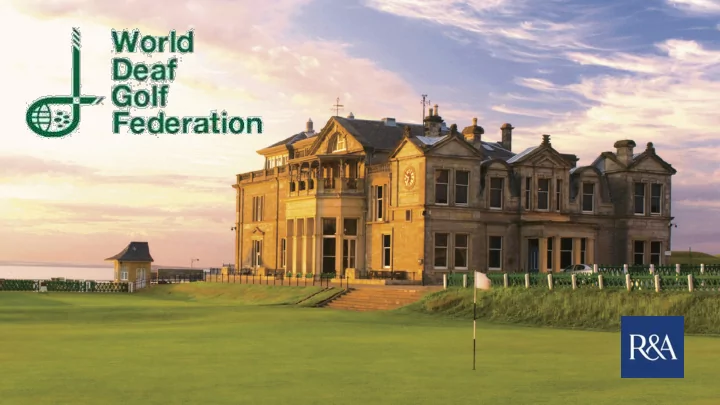

Background: World Deaf Golf Federation Ø July 1994 – Founders meeting Ø January 2017 – Implemented Strategic/Business Plan Ø August 1995 – WDGF established Ø July/August 2020 – Celebrate Silver Jubilee @ WDGC in England Ø World Deaf Golf Championships over the years: *137 114 108 99 98 96 96 93 89 70 *estimated
Deaflympics The International Committee of Sports for the Deaf (ICSD) is the main governing body responsible for the organization of Deaflympics and other World Deaf Championships. Founded in 1924 and known as the CISS (Comité International des Sports des Sourds), the ICSD is now approaching the pivotal mark of being the organization behind the building, evolving and fortifying the tradition of inviting deaf/hard of hearing elite athletes from all of the world to come together not only to compete in their respective sports, but to also develop comradeships between their countries.
Audiogram Inline with the International Committee of Sports for the Deaf (ICSD) ü One eligibility criteria is established: Deaf, defined as a hearing loss of at least 55dB pure tone average (PTA) in the better ear (three-tone pure tone average at 500, 1000 and 2000 Hertz, air conduction, ISO 1969 Standard) ü All athletes are issued an ICSD ID number as a proof of eligibility. ü This criteria applies to all ICSD-sanctioned events: ü Summer/Winter Deaflympics ü World Deaf Championships ü Regional Deaf Championships (Pan Am, Asia-Pacific, Europe, & Africa) ü Deaf sporting events including qualifications and club championships ü Athletes are strictly forbidden to use any kind of hearing aid(s)/amplifications or external cochlear implant parts during warm-up and competitions within restricted zones, which are established in each sport. ü Restricted Zone @ WDGC & Deaflympics: during stipulated rounds
Barriers for Golfers with Hearing Loss 1. Communication barriers a. Playing with hearing peers (Rules of Golf, socializing) b. Golf clubs – access to their AGM, Committees, etc. c. Coaching d. Access to Information (Rules of Golf, News, etc.) 2. Interpreting Service Costs 3. Playing on courses: a. “Swoosh” sounds: mild to profound hearing loss, even with hearing aids/cochlear implants, cannot hear this to assist with improvement of their golf game. b. Can’t hear balls hit trees, water, etc. = more search time 4. Need more support from national golf bodies a. Developing in golf: deaf golfers are behind hearing and/or elite golfers in development. When Deaf golfers play together, they are on the same level playing field.
Mental Health • Mental Health Studies prove that lack of communication and isolation have an impact on mental health of people with hearing loss. Example resources from various countries: • http://hearforyou.com.au/statsandresearch/ (Australia) • https://www.researchgate.net/publication/221712323_Mental_health_of_deaf_people (USA, Germany) • Participating in golf increases physical involvement, but not being able to communicate or participate in golf activities (AGM, Club meetings) besides rounds of golf increases the stress levels in varying degrees among Golfers with hearing loss. • To enhance performance and improved mental health, Deaf Golfers need access to: • coaches • nutritionists • other resources • fitness trainers • sports psychologists • Having support at WDGC/Deaflympics from family, friends, peers, and officials improve the mental health of golfers including confidence boost and happiness. • Example: Allen John – a Deaf German Golfer, WDGC Men Champion (2016), & Deaflympic Gold Medalist (2017).
Questions / Answers
Recommend
More recommend